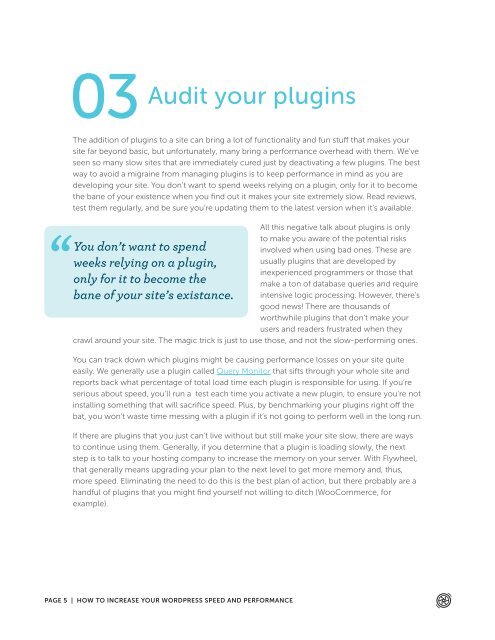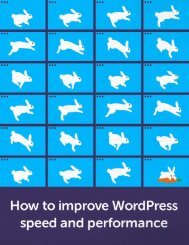Yumpu.com
Create successful ePaper yourself
Turn your PDF publications into a flip-book with our unique Google optimized e-Paper software.
03<br />
Audit your plugins<br />
The addition of plugins to a site can bring a lot of functionality and fun stuff that makes your<br />
site far beyond basic, but unfortunately, many bring a performance overhead with them. We’ve<br />
seen so many slow sites that are immediately cured just by deactivating a few plugins. The best<br />
way to avoid a migraine from managing plugins is to keep performance in mind as you are<br />
developing your site. You don’t want to spend weeks relying on a plugin, only for it to be<strong>com</strong>e<br />
the bane of your existence when you find out it makes your site extremely slow. Read reviews,<br />
test them regularly, and be sure you’re updating them to the latest version when it’s available.<br />
You don’t want to spend<br />
weeks relying on a plugin,<br />
only for it to be<strong>com</strong>e the<br />
bane of your site’s existance.<br />
All this negative talk about plugins is only<br />
to make you aware of the potential risks<br />
involved when using bad ones. These are<br />
usually plugins that are developed by<br />
inexperienced programmers or those that<br />
make a ton of database queries and require<br />
intensive logic processing. However, there’s<br />
good news! There are thousands of<br />
worthwhile plugins that don’t make your<br />
users and readers frustrated when they<br />
crawl around your site. The magic trick is just to use those, and not the slow-performing ones.<br />
You can track down which plugins might be causing performance losses on your site quite<br />
easily. We generally use a plugin called Query Monitor that sifts through your whole site and<br />
reports back what percentage of total load time each plugin is responsible for using. If you’re<br />
serious about speed, you’ll run a test each time you activate a new plugin, to ensure you’re not<br />
installing something that will sacrifice speed. Plus, by benchmarking your plugins right off the<br />
bat, you won’t waste time messing with a plugin if it’s not going to perform well in the long run.<br />
If there are plugins that you just can’t live without but still make your site slow, there are ways<br />
to continue using them. Generally, if you determine that a plugin is loading slowly, the next<br />
step is to talk to your hosting <strong>com</strong>pany to increase the memory on your server. With Flywheel,<br />
that generally means upgrading your plan to the next level to get more memory and, thus,<br />
more speed. Eliminating the need to do this is the best plan of action, but there probably are a<br />
handful of plugins that you might find yourself not willing to ditch (WooCommerce, for<br />
example).<br />
PAGE 5 | HOW TO INCREASE YOUR WORDPRESS SPEED AND PERFORMANCE



